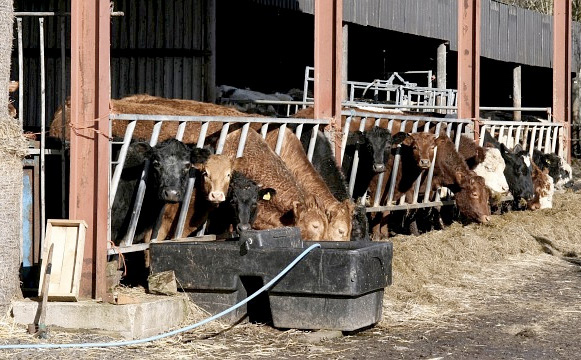
The effect a TB breakdown can have on farming businesses was the main topic of discussion when a delegation of NFU members met with their local Assembly Member, Kirsty Williams and local MP, Roger Williams recently.
Stuart Morris, Brecon and Radnor NFU Cymru County Chairman said: “Dealing with a breakdown of bovine TB is absolutely draining, not only emotionally with the loss of productive animals but also financially as farmers have to contend with the pressures of providing adequate feed, bedding and housing for additional cattle whilst under stringent movement restrictions.”
The Welsh Government has recently consulted with the industry on proposals to move to a tabular based valuation system for TB reactors in Wales, a move which members throughout Brecon and Radnor firmly oppose.
Stuart Morris continued, “The future of beef herds in particular is extremely fragile as farmers worry for their livelihoods if they suffer a TB breakdown. We want a valuation system that will encourage farmers to be confident to be part of a thriving beef industry in Brecon and Radnor. The system has to be fair but the implementation of a tabular valuation system will simply deter farmers from investing in their cattle herds with a view to improving bloodlines and the quality of their breeding stock and end product in an attempt to improve profitability.
“The proposed move to a tabular valuation system fails to acknowledge the weight, conformation or performance characteristics of an animal and this is grossly unfair. If this system is introduced we could see farmers leaving the beef sector, which could devastate our livestock markets and our abattoirs in Wales. We sincerely hope that Welsh Government carefully considers NFU Cymru’s consultation response.”
Members present also raised their concerns on the findings of the recent Which? Survey, which found that lamb was being substituted by cheaper meats in some takeaway food.
John Davies, NFU Cymru Deputy President said, “Brecon and Radnor is one of the most densely populated sheep producing areas and we are astonished that this type of activity has been found. We produce a quality product, whilst adhering to stringent regulations on animal identification and movements and this type of behaviour is wholly unacceptable.
"We welcome the announcement made by the Food Standards Agency (FSA) to increase sampling procedures, with the assistance of local authorities. It is vital that food integrity and authenticity is upheld throughout the entire food chain.”
NFU President Meurig Raymond said the decision not to extend the pilot culls was a 'bitter disappointment.'
"This TB breakdown only goes to emphasise the importance of controlling the reservoir of TB in wildlife. Without being able to control the wildlife which is spreading disease to their cattle they are rightly hugely frustrated and angry. It has a strangle-hold on their business.
"Farmers continue to bear the brunt of regulations too. More and more we are seeing tighter cattle controls introduced but they are pointless without also tackling this disease in badgers.
"I remain very concerned about the conclusions drawn in Independent Expert Panel report published last week. It has skewed the government’s decision on the wider use of the badger control policy.
"While the IEP did outline accurately the challenges faced by those delivering the badger cull pilots, it has also made many assumptions based on anecdote, unpublished work which hasn’t been peer reviewed, or selective use of evidence.
"It’s conclusions on humaneness and effectiveness are simply not reflected in the experiences of those people on the ground.
"What is clear is that we need to look at other ways of controls badgers if we are to reduce TB in cattle. I will be visiting Ireland to look at how they have achieved success in reducing badger numbers and TB. The NFU is also committed to doing its own analysis of all of the evidence to help find a way forward for the current policy."
